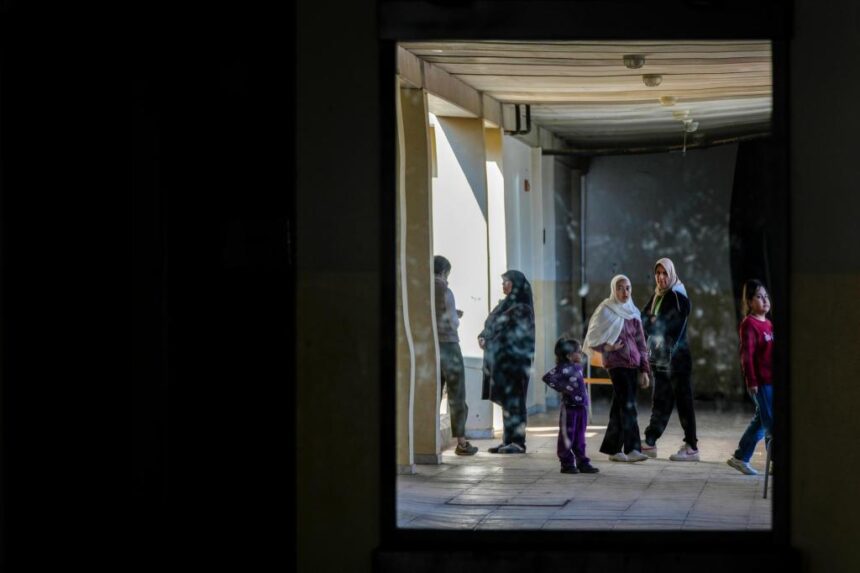By MELANIE LIDMAN, JULIA FRANKEL and FADI TAWIL
TEL AVIV, Israel (AP) — Rocket barrages fired from Lebanon killed seven people in northern Israel on Thursday, authorities said, hitting agricultural areas along the border and near the city of Haifa in back-to-back attacks that represented the deadliest spate of strikes from Lebanon since the Israeli military invaded the country earlier this month.
The violence came as top U.S. diplomats were in the region to push for cease-fires in Lebanon and Gaza, hoping to wind down the wars in the Middle East in the Biden administration’s final months. Pressure has been building ahead of the U.S. election next week.
Lebanon’s Hezbollah militant group has been firing thousands of rockets, drones and missiles into Israel, and drawing fierce Israeli retaliatory strikes, in the year since Hamas’ Oct. 7 attack out of the Gaza Strip triggered Israel’s invasion and bombardment of the Palestinian enclave. Both Hezbollah and Hamas are backed by Iran, Israel’s regional adversary. Hezbollah did not immediately claim responsibility for Thursday’s rocket fire.
The conflict along Israel’s northern border escalated into a full-blown war last month, when Israel launched a wave of heavy airstrikes across Lebanon that killed Hezbollah’s top leader, Hassan Nasrallah, and most of his deputies. Israeli ground forces pushed into southern Lebanon on Oct. 1. Over the past year, the broadening Israeli campaign against Hezbollah has killed 2,800 people in Lebanon, wounded nearly 13,000 and devastated Lebanese towns near the border.
Some 1.2 million people in Lebanon have been displaced since Israel’s escalation in September. Hezbollah’s intensified rocket attacks into Israel have forced 60,000 Israelis to evacuate from communities near the border. Over a year into the war, they remain displaced.
On Thursday, projectiles from Lebanon crashed into an agricultural area in Metula, Israel’s northernmost town, killing four foreign workers and an Israeli farmer in the deadliest such attack since Israel launched its ground invasion.
The residents of Metula evacuated in October 2023, and only security officials and agricultural workers remain.
The Hotline for Refugees and Migrants, an Israeli organization that advocates for foreign workers, said authorities had put them in danger by allowing them to work along the border without proper protection.
Hours later, the Israeli military reported another volley of some 25 rockets crossing into Israel from Lebanon, striking an olive grove in a suburb of the northern port city of Haifa.
Thursday’s second barrage killed a 30-year-old man and 60-year-old woman, reported Magen David Adom, Israel’s main emergency medical organization, and wounded two others. Israeli media reported that the victims had gathered to harvest olives at the time of the attack.
Agricultural areas along Israel’s border, where much of the country’s orchards are located, are closed military zones patrolled by Israeli troops that can only be entered with official permission. For the few residents remaining in the area, the thump of missile interceptions by Israel’s Iron Dome aerial defense system and the constant wailing of sirens warning of incoming rocket fire punctuate daily life.
Nonetheless, local officials in Israel largely support continuing a ground operation in southern Lebanon.
Amos Hochstein, a special adviser to President Biden on the Israel-Hezbollah conflict, has been pushing for a cease-fire deal to address the fighting with Hezbollah in Lebanon.
“If the Israeli government will accede to an agreement that was brought by Amos Hochstein … we will not have it because for us this is rehabilitating Hezbollah again on our borders,” said Eitan Davidi, the mayor of the northern town of Margaliot where air raid sirens sounded repeatedly Thursday. “Hezbollah is firing towards civilians and farmers and hit innocent farmers that are working in the field.”
Hezbollah’s newly named top leader, Sheikh Naim Kassem, said in a video statement Wednesday that the militant group will keep fighting Israel until it is offered cease-fire terms it deems acceptable. He said it has recovered from a series of setbacks in recent months, including attacks using explosive pagers and walkie-talkies that was widely blamed on Israel.
“Hezbollah’s capabilities are still available and compatible with a long war,” he said.
Earlier on Thursday, the Israeli military warned people to evacuate from more areas of southern Lebanon, as airstrikes in different parts of the country killed eight people, according to Lebanon’s state-run National News Agency.
Thousands of people have fled from Baalbek, the main city in Lebanon’s eastern Bekaa Valley, and surrounding areas in the last 24 hours following Israeli evacuation warnings.
Jean Fakhry, a local official in the Deir al-Ahmar region in the Bekaa Valley, said Israeli airstrikes pummeling the area turned the main highway “a parking lot” of fleeing cars stuck in traffic. Around 12,000 displaced people are staying in the area, he said, with most taking refuge in private homes.
At one of the shelters in Deir al-Ahmar, families with luggage were still arriving on Thursday.
“Our homes were destroyed,” said Zahraa Younis, from the village near Baalbek. “We came with nothing — no clothes or anything else.”
___
Frankel reported from Jerusalem and Tawil from Deir al-Ahmar, Lebanon. Associated Press writer Eleanor H. Reich in New York contributed to this report.
___
Follow AP’s war coverage at https://apnews.com/hub/israel-hamas-war
Originally Published:










